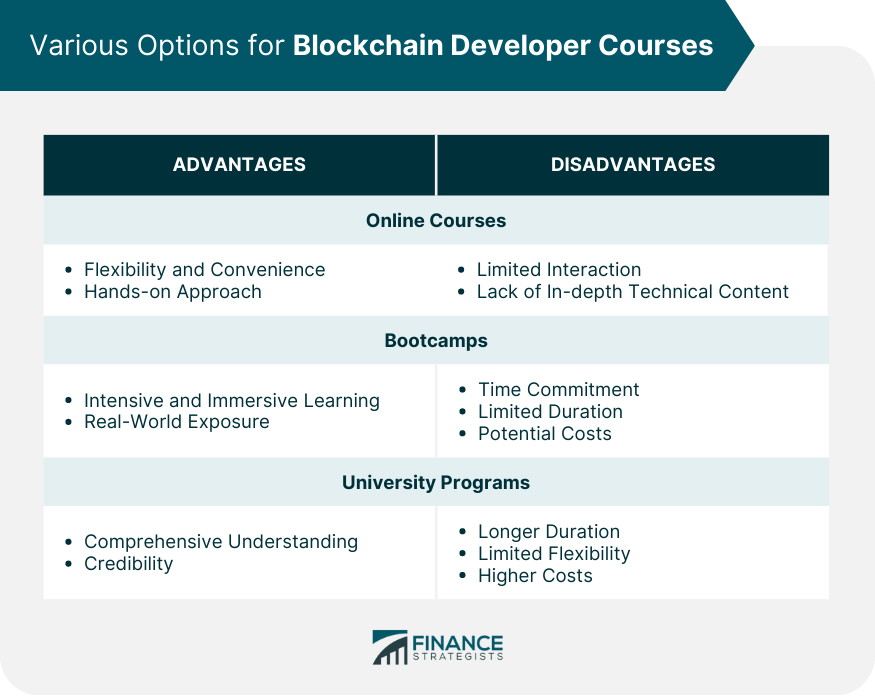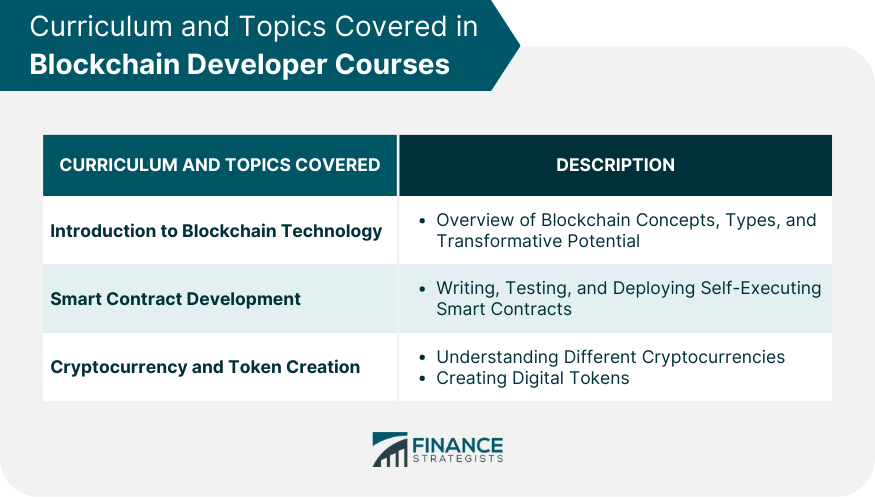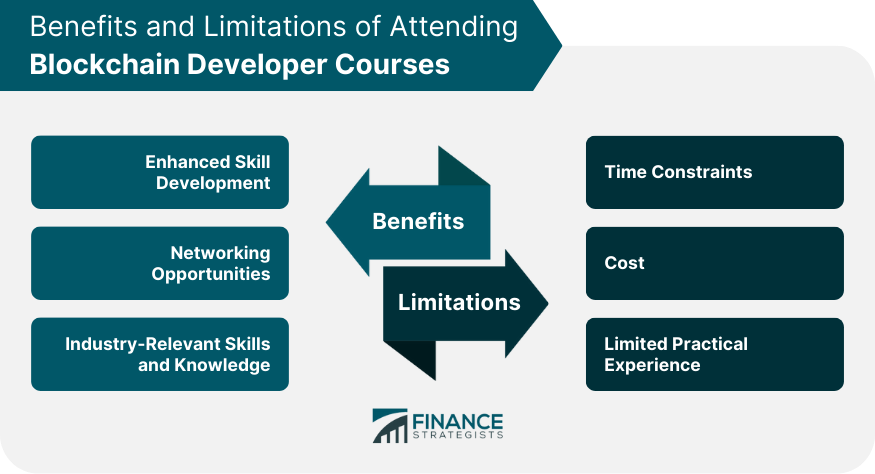Blockchain Developer Courses refer to educational programs or training that focus on providing individuals with the knowledge and skills required to develop and work with blockchain technology. Blockchain technology, at its core, is a distributed ledger system that facilitates the recording and storing of transactions across numerous computers in such a manner that the records cannot be altered retroactively. These courses typically cover topics such as blockchain fundamentals, smart contract development, decentralized application (DApp) development, cryptography, and blockchain platforms like Ethereum. They aim to equip participants with the technical expertise needed to build and deploy blockchain-based solutions, as well as understand the underlying principles and mechanisms of blockchain networks. These courses can be found online through various platforms, in-person bootcamps, or as part of university programs. The surge in the demand for blockchain developers has led to an increase in the number of online courses available. These courses provide flexibility and convenience to the learners, who can complete them at their own pace and time. Online courses typically cover the basics of blockchain technology, smart contracts, and cryptocurrencies. Some advanced courses also delve into the technical aspects of blockchain development, such as building decentralized applications (DApps) or creating your own cryptocurrency. The hands-on approach of many online courses can help aspiring blockchain developers understand the technology's practical applications. Bootcamps provide a more intensive and immersive learning experience than typical online courses. They are designed to equip students with the necessary skills and knowledge in a relatively short period, usually a few weeks to several months. In a bootcamp, learners are exposed to real-world scenarios and challenges that help them understand the practical aspects of blockchain development better. Bootcamps are beneficial for those who can commit to a rigorous learning schedule and desire a faster route to proficiency. They provide learners with an opportunity to work on real-life projects, interact with industry professionals, and gain a deep understanding of blockchain technology. Universities worldwide have started to recognize the potential of blockchain technology and have incorporated blockchain development courses into their curriculums. These programs provide a comprehensive understanding of blockchain technology and its application across various sectors. University programs usually offer a more structured approach to learning, with a detailed curriculum covering a broad range of topics. They provide a deep understanding of the technology and its underpinning concepts, along with hands-on experience through lab work and project-based assignments. University programs also lend a degree of credibility to the qualification, which can be beneficial in job applications. Coursera, a renowned online learning platform, offers numerous courses on blockchain development. These courses are designed and taught by industry professionals and educators from top universities worldwide. They cover a wide range of topics from basic concepts of blockchain technology to specialized areas like smart contract development and blockchain for business. The platform also offers several specialization programs, which are a series of courses focusing on a specific area of blockchain technology. This makes Coursera a popular choice among both beginners and those looking to further their knowledge in a particular area of blockchain development. Udemy is another popular online learning platform offering numerous courses on blockchain technology. The courses on Udemy are often very practical, focusing on teaching students how to develop blockchain applications or smart contracts. Some courses even delve into niche topics such as building decentralized applications (DApps) or developing your own cryptocurrency. Udemy courses are typically shorter than those offered on other platforms, making them a good option for individuals who wish to learn a specific aspect of blockchain technology in a short period. Furthermore, the platform often offers significant discounts on courses, making it a cost-effective option. edX, a joint venture between Harvard University and MIT, also offers several courses on blockchain technology. The courses available on edX are often more academic in nature and are designed to provide a comprehensive understanding of the technology. The platform's courses delve into the technical aspects of blockchain technology, including the algorithms and principles that underpin it. This makes edX a good choice for those looking for a more in-depth understanding of blockchain technology. Some courses also offer certificates upon completion, which can be an added advantage for job seekers. An introduction to blockchain technology is usually the first topic covered in blockchain developer courses. It provides a comprehensive overview of the technology and its fundamental concepts. Topics typically include the history and evolution of blockchain, its structure and mechanics, and its various types, such as public and private blockchains. This introductory module also delves into the use cases of blockchain across various sectors, thereby highlighting its transformative potential. It equips learners with the foundational knowledge necessary to understand more complex aspects of blockchain technology in subsequent modules. Smart contract development is a vital aspect of blockchain developer courses. Smart contracts are self-executing contracts with the terms of the agreement directly written into code. They automatically execute transactions when pre-set conditions are met, eliminating the need for intermediaries and reducing the potential for disputes. Courses typically teach popular smart contract programming languages like Solidity (used on the Ethereum platform) and help learners understand how to write, test, and deploy smart contracts. By learning this, students can start to build decentralized applications or create their own cryptocurrencies. Cryptocurrency and token creation is another key topic covered in blockchain developer courses. As digital currencies are one of the most prominent applications of blockchain technology, understanding their workings is essential for any blockchain developer. Courses teach learners about the different types of cryptocurrencies, their structures, and their uses. Learners also get to understand the process of creating their own digital tokens using blockchain technology. This usually involves coding their own smart contracts and deploying them on a blockchain. This knowledge is crucial for those who aspire to work in the rapidly evolving field of digital currencies. Blockchain developer courses provide an effective way for learners to acquire and develop the skills necessary for a career in blockchain development. They offer comprehensive training on the theoretical aspects of blockchain technology, as well as practical skills like coding smart contracts, creating digital tokens, and developing decentralized applications. Courses also expose learners to a variety of learning resources, such as video tutorials, quizzes, assignments, and projects, which reinforce learning and enhance skill development. This multifaceted approach to learning ensures that learners get a robust understanding of the technology and its applications, setting them up for success in their blockchain development careers. Blockchain developer courses often provide learners with ample networking opportunities. They get to interact with fellow learners, course instructors, and industry professionals, enabling them to build valuable connections in the blockchain industry. For instance, many online courses have discussion forums where learners can exchange ideas, ask questions, and engage in meaningful discussions on various aspects of blockchain technology. Additionally, some courses organize webinars and workshops featuring industry experts, providing learners with insights into the latest trends and developments in the blockchain space. One of the key benefits of attending blockchain developer courses is that they equip learners with industry-relevant skills and knowledge. The curriculum of these courses is often designed in collaboration with industry experts to ensure that it aligns with current industry trends and requirements. Moreover, courses often involve practical projects that simulate real-world scenarios, enabling learners to apply what they've learned in a practical context. This not only strengthens their understanding of blockchain technology but also prepares them for the challenges they might face in their careers as blockchain developers. While blockchain developer courses have numerous benefits, they also have some limitations. One of these is time constraints. These courses often require a significant investment of time, especially those that provide a comprehensive understanding of blockchain technology. For individuals who are working full-time or have other commitments, finding the time to dedicate to these courses can be challenging. Moreover, mastering blockchain development is not a quick process; it requires a substantial amount of time and consistent effort. While there are some free courses available, most comprehensive and high-quality courses come with a fee. Some specialized courses and university programs can be quite expensive. However, it's important to consider the cost of these courses as an investment in one's future. The skills and knowledge gained from these courses can open up numerous opportunities in the blockchain industry, potentially leading to high-paying jobs. Another limitation of blockchain developer courses is that they may not provide enough practical experience. While many courses include practical assignments and projects, these may not be sufficient to replicate the challenges faced in real-world scenarios. Practical experience is crucial in blockchain development as it helps learners understand how the technology works in a real-world context. Therefore, learners may need to seek additional opportunities, such as internships or project-based work, to gain more practical experience. Blockchain developer courses play a crucial role in this regard by providing aspiring developers with the knowledge and skills they need to excel in this field. These courses provide a comprehensive understanding of blockchain technology, its applications, and its development aspects. By attending these courses, learners can acquire industry-relevant skills, network with professionals in the field, and enhance their career prospects. However, they should also be mindful of the limitations, such as time constraints, cost, and limited practical experience. Blockchain could become a standard technology in the finance industry, leading to a proliferation of jobs in blockchain development. As such, investing in a blockchain developer course could be a wise career move for those interested in technology and finance.Overview of Blockchain Developer Courses
Various Options for Blockchain Developer Courses
Online Courses
Bootcamps
University Programs

Online Platforms Offering Blockchain Developer Courses
Coursera
Udemy
edX
Course Curriculum and Topics Covered
Introduction to Blockchain Technology
Smart Contract Development
Cryptocurrency and Token Creation

Benefits of Attending Blockchain Developer Courses
Enhanced Skill Development
Networking Opportunities
Industry-Relevant Skills and Knowledge
Limitations of Attending Blockchain Developer Courses
Time Constraints
Cost
Limited Practical Experience

Conclusion
Blockchain Developer Courses FAQs
A blockchain developer should have a strong background in computer science and proficiency in programming languages such as JavaScript, Python, and Solidity. They should also understand the fundamentals of blockchain technology, including smart contracts, distributed ledger technology, and consensus algorithms.
While prerequisites can vary depending on the course, a basic understanding of computer science and proficiency in at least one programming language are generally recommended.
The duration of a blockchain developer course can vary widely. Some online courses can be completed in a few weeks, while university programs and comprehensive online courses can take several months.
After completing a blockchain developer course, you can apply for roles such as blockchain developer, blockchain engineer, blockchain consultant, and blockchain solution architect, among others.
Yes, blockchain developer courses can be extremely worthwhile for those interested in a career in this field. They provide comprehensive training in blockchain technology and its applications, equipping learners with the skills and knowledge needed to excel in the blockchain industry.
True Tamplin is a published author, public speaker, CEO of UpDigital, and founder of Finance Strategists.
True is a Certified Educator in Personal Finance (CEPF®), author of The Handy Financial Ratios Guide, a member of the Society for Advancing Business Editing and Writing, contributes to his financial education site, Finance Strategists, and has spoken to various financial communities such as the CFA Institute, as well as university students like his Alma mater, Biola University, where he received a bachelor of science in business and data analytics.
To learn more about True, visit his personal website or view his author profiles on Amazon, Nasdaq and Forbes.











